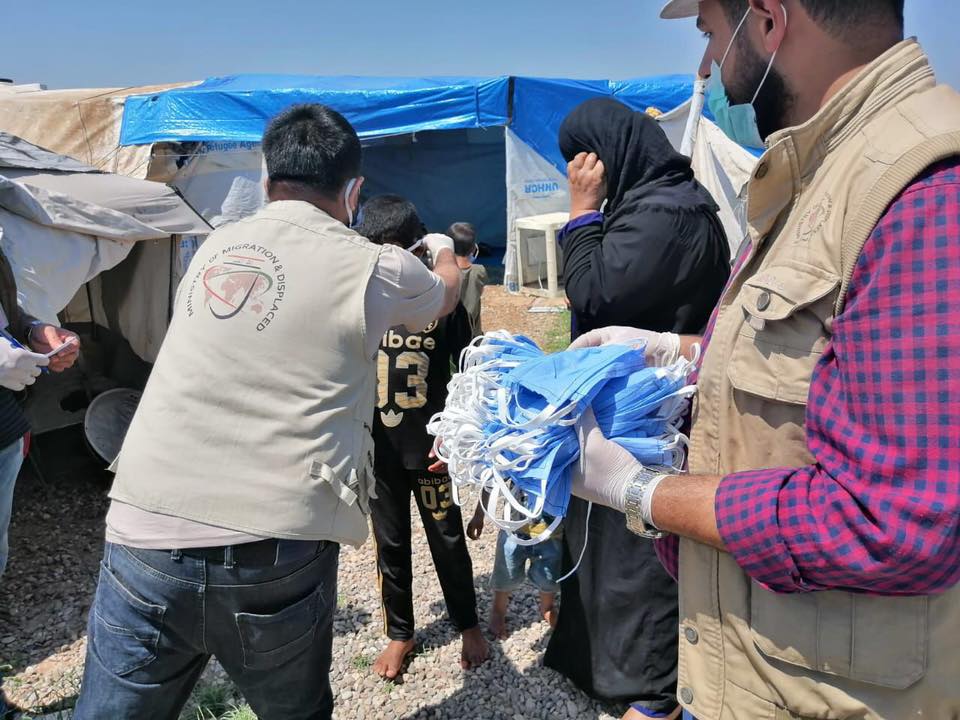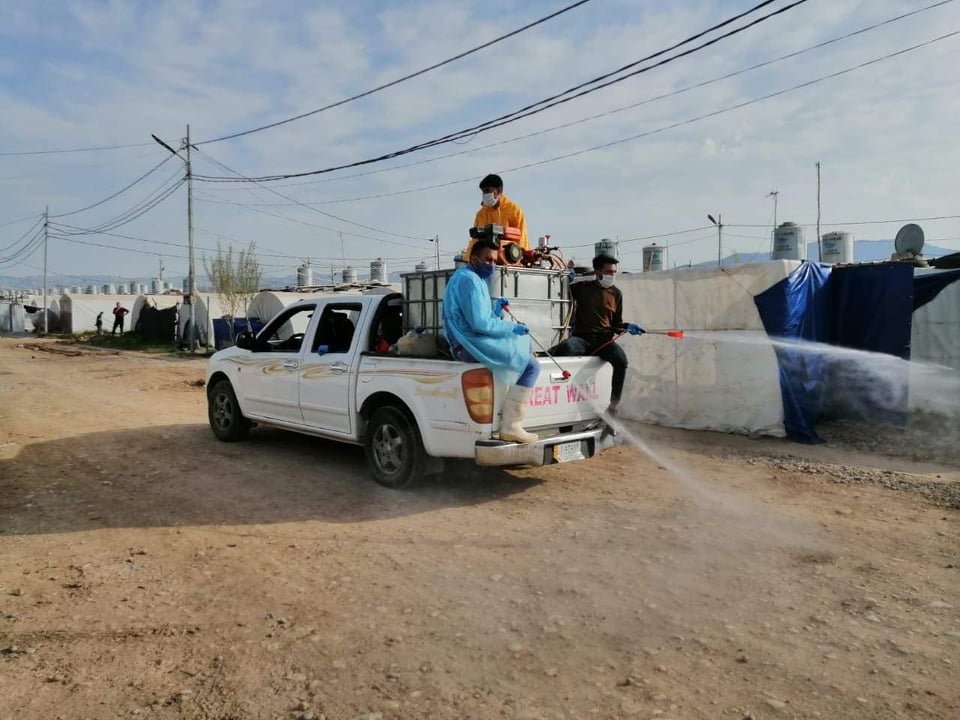Chnar Msto is greatly concerned about the coronavirus and cannot acquire the necessary medical equipment; whenever she goes to the small health clinic of the camp to get masks and gloves, she goes back to her tents empty handed.
“During the lockdown, I went to the camp’s clinic twice, I asked for masks and gloves, they said we do not have it, go buy it elsewhere,” Msto said.
What has greatly frustrated the 21 years old woman is that as she cannot get the masks and gloves from the clinic, she is also prohibited from going outside of the camp. The Internally Displaced Persons (IDPs) have for nearly two months remained in their tents due to the enforcement of the curfew aimed at preventing the spread of coronavirus.
Msto, who has resided in Sharya IDP camp for five years, said, “inside the camp, the medical protections are rarely available and they do not allow us to go and buy them in the pharmacies outside.”
The medical protections are rarely available and they do not allow us to go and buy it in the pharmacies outside
A significant number of the IDPs do not receive the aid of the organizations, while they no longer work due to the enforcement of the curfew. Many of them have faced food and daily necessities shortages.
“We were only once given a small package of cleaning materials, that lasted weeks,” Msto added.
The IDPs camps across the country have been placed under a curfew to stop IDPs’ interaction with outside, aiming at preventing the spread of the coronavirus, according to the Iraqi Ministry of Displacement and Migration decision.
Sa’dun Abdullah, head of Essyan IDP camp in Shekhan district, said, “we only have one health clinic, the medication and medical supplies shortages are big in the camp, since the spread of the virus, we have not been able to distribute masks and gloves. The IDPs have bought them on their own.”
Occasionally, the camps including the tents of the IDPs are disinfected.

Nineveh, employees of the Ministry of Migration and Displacement are distributing masks in an IDP camp, April 2020. Photo: The Ministry of Migration and Displacement
Abdullah said that the office of the Ministry of Migration and Displacement has provided them with four types of cleaning supplements for the IDPs, and also they are raising awareness.
There are still 86 camps, among those 184 camps that were already built to accommodate IDPs with the advance of the militants of the self-claimed Islamic State (IS) across Iraq, including the Kurdistan Region. Eighty-six camps still house thousands of families, according to the statistics of the Iraqi Ministry of Displacement and Migration.
Adnan Haji, 29, who is a graduate of the college of nursing, has formed a group to make masks and distribute them over the IDPs.
The group is working in Qadyan camp, where the Dak organization provides them the materials to make the masks. Daily, they produce 250 to 300 masks.
“Our work does not have a morning or night shift (indicating they are always working), we want to make at least 20 thousands masks because people desperately need them,” Haji said.
The Iraqi Ministry of Displacement and Migration has formed the Crisis Cell to provide the IDPs with food and medical supplies even when the curfew is imposed.
Eido Faisal, who is from Grozir sub-district in Sinjar, now resides in an unfinished house in the outskirts of Duhok. He is the father of nine children and is going through a challenging life.
People like us are deprived of every right
“People like us are deprived of every right, we have not been provided with anything, we have bought some masks, gloves, and other cleaning supplies,” Faisal said.
Faisl thinks that the way the IDPs are delivered least medical services compared to medical services delivered to the people of the cities. He explained medical supplies are available to them but no one considers the situation of the IDPs.
One million and 400 thousand Iraqi IPDs are in danger due to the spread of the coronavirus, according to a report published by the United Nations.
Jasm Hamadi, undersecretary of the Ministry of Displacement and Migration, in the UN report, states those areas whose population is intense such as the camps are hardly delivered with medical services and observations, increasing the chance of exposing to the coronavirus.
The coronavirus figures in Iraq reached 2085 cases, only one of which is recorded in the Darashakran Refugee camp in Erbil.
Ismail Mohamemd, deputy Duhok governor for IDPs and Refugees affairs reiterated the implementation of the medical instructions in the camps and told KirkukNow, “we have taken all the necessary measures, but we cannot claim that there are not the threats of coronavirus in the camps.
We cannot claim that there are not the threats of coronavirus in the camps
“In the IDP camps, there are either small health clinics or mobile clinics that consist of medical teams, without any medical department to treat patients.
The Ministry of Displacement and Migration has distributed masks and gloves over the IDPs, but has not been able to adequately provide the IDPs with such necessary medical supplies.
Ulya Hussein Bazaz, head of the ministry’s office in the Kurdistan Region, claimed that they have distrtbuted 33 thousand masks in three camps in Erbil, according to a statement recently issued.
The United Nations High Commissioner for Refugees (UNHCR) will provide 110 thousands of IDP and refugee families with cash to buy necessary medical supplies.
The IDPs and Refugees are concerned about the spread of the virus and lack medical protections as well as money to acquire them, the statement says.
Six million Iraqis, an equivalent to 15 percent of the country’s population, were displaced between mid-2014 to 2017 due to the IS advance and retaking those areas by the Iraqi forces. Many of those IDPs still live in camps to the lack of basic services and unstable security situation in their home towns.





